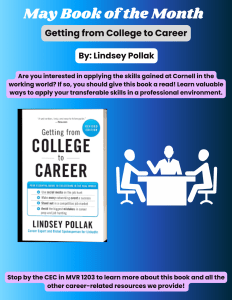Getting from College to Career: Your Essential Guide to Succeeding in the Real World
By Lindsey Pollak
For the month of May we will be reading Getting from College to Career: Your Essential Guide to Succeeding in the Real World by Lindsey Pollak. We will be reading this book now because it can provide insights into how to transition into the professional world which can be especially helpful as we are nearing summer when many students start jobs and internships. The world of work is different from college, but both environments share many similarities. Many of the skills learned in college are transferable and can be applied to a professional setting which this book explores.
The author, Lindsey Pollak, is a consultant and speaker specializing in career and workplace advice. She received her bachelor’s degree from Yale University and since then she has published many books related to career development including Becoming Your Own Boss: New Rules for the Next Generation of Leaders. Similarly to her other works, Getting from College to Career places great emphasis on how to become a leader by using your past experiences.
Getting from College to Career is broken up into 10 sections which guide the reader through the process of transitioning from college to career. The parts of the book are: 1) Getting Started, 2) Stop Being a Student and Start Being a Professional, 3) Figuring out What You Want… and What You Don’t, 4) Talk, Listen, Repeat (i.e., Network), 5) Gain Real World Experience, 6) Give Yourself an Edge, 7) Market Yourself on Paper and Online, 8) Find Opportunities, 9) Overprepare for Interviews, and 10) Before You Head Off into the Real World…
Some of the most relevant information in Getting from College to Career for Cornell students is in sections 3 and 9. Section 3 includes advice on how to narrow down your interests while still exploring all of your passions which can be very difficult for students especially during the early stages of their careers. Section 3 also provides essential guidance regarding letting go of what you “should” do and “should” want and instead investing your energy into finding what speaks to you. Section 9 is very applicable to students with approaching interviews. The best advice in this chapter pertains to doing your research on the organization you are interviewing for and how to dress accordingly for different environments.
If you are interested in learning more about how to transition from Cornell to the professional world before your summer endeavors, stop by the CEC in MVR 1203 to check out this book or talk to a Career Assistant about your summer plans!

